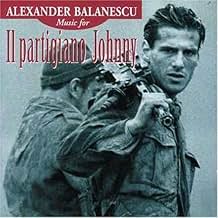Füge eine Handlung in deiner Sprache hinzuAfter 8 September 1943, Northern Italy is occupied by the Germans. The Italian army collapses and the soldiers escape to the mountains to set up a resistance. Many civilians do the same, and... Alles lesenAfter 8 September 1943, Northern Italy is occupied by the Germans. The Italian army collapses and the soldiers escape to the mountains to set up a resistance. Many civilians do the same, and Johnny, an English literature student, is among them. Johnny avoids joining the red parti... Alles lesenAfter 8 September 1943, Northern Italy is occupied by the Germans. The Italian army collapses and the soldiers escape to the mountains to set up a resistance. Many civilians do the same, and Johnny, an English literature student, is among them. Johnny avoids joining the red partisans (Communists) and tries to be part of the azure bands (former regular soldiers). In bo... Alles lesen
- Regie
- Drehbuch
- Hauptbesetzung
- Auszeichnungen
- 1 Gewinn & 2 Nominierungen insgesamt
Empfohlene Bewertungen
What I believe probably happened here is that the director tried to make a faithful adaptation for the screen of a novel which is almost impossible to film. I haven't read the book, but I can imagine it must be similar in the way it is constructed to a novel by Marcel Proust. By this I mean a lot of introspective thinking, endless depictions of a state of mind, almost no narrative or plot whatsoever... Well, this is fine in a well written book, but is almost impossible to successfully transpose onto film. This novel should probably have best been left on the bookshelf where it belongs.
Johnny engages in tragic and bloody battles where he looses some friends and meet new ones, he is thrown into a journey which sometimes doesn't even make sense to himself anymore.
Il Partigiano Johnny is one of the most well-made war movies, the atmosphere, environments, places, is perfect and realistic. The acting is great, the music: great. Most of the soundtrack consists of classical music. This is way better than any Spielberg-Hollywood-war-movie. This is a must-see and it's very sad to see it hasn't been released on more spread DVD's in other countries!
The streets, the interiors, the women, even the actor faces are the type of face they used to have in the 40's movies!!
It looks like a perfect example of the Neorealists movies of the 40's, like "Sciuscia", "Roma, citta aperta", "Humberto D.", etc. But as a watchable and pleasant movie..., it's so boring to see this partisans shooting, and shooting..., and shooting... into the far forest or hills around, without seeing the enemy or even a pigeon falling from the sky because a fatal blow reached it by mistake.
Everybody looks so famished and basic. Maybe I'm unjust because I don't care for this kind of movies and it's my problem, but even so, a whole movie of shooting around can be quite hard to swallow.
There are no likable characters, it looks like they are in the middle of winter without proper clothes, constantly suffering hunger and cold..., very uncomfortable! but maybe that was exactly the idea, to get us into the skin of these poor souls and so better understand the sacrifice they went through for an ideal of liberty.
Very well executed, no doubt, but I give it to you wrapped in multicolored cellophane with a nice bow tied on with my most sincere compliments.
However, the director remains almost imprisoned in his attempt to transpose Fenoglio's book into a film. He tends to portray too many isolated parts of the book with strict accuracy and so misses the substance. Some crucial themes are just hinted at and almost impossible to catch for a viewer who didn't read the book: the partisans' disorganization, the feuds between communist and moderate bands, the reluctance of the latter to engage in any serious fight, Johnny's critical relationship towards his comrades that moves him to switch allegiance from one group to another. Furthermore, the fighting scenes are decontextualized beyond the point; for example, the partisans' desperate effort to melt through the lines of the major Fascist encirclement does not express the drama conveyed by Fenoglio's intense description, and is almost reduced to a fighting scene like any other.
The film tends to concentrate on one message: the boredom and meaninglessness of war, and especially of partisan warfare, dominated by long periods of inactivity suddenly broken by abrupt, mostly unexpected shootouts against an often invisible enemy. In a different cultural context this might be a powerful message, but in present cinematography it seems to me too conventional and politically correct to deserve any special praise. Where is a war film that doesn't strive to convey some kind of pacifist undercurrent? In the same way, Johnny's silent, introverted idealism embodies a contrasting point to the general atmosphere of monotony and purposelessness. It risks to turn the film into still another idealization of Antifascist resistance and the protagonist into the stereotype of the tormented hero, full of misgivings and yet willing to overcome his doubts and problems to advance the cause of good and see that justice is finally done. If you want to build a Proustian mood please do not warp it subtly in its opposite by appending some redeeming ideological mumbo jumbo to it.
A remarkable film to watch for the patient viewer, but do yourself a favor and watch it cum grano salis.
Wusstest du schon
- SoundtracksBambina Innamorata
Written by Giovanni D'Anzi (as D'Anzi) and Alfredo Bracchi (as Bracchi)
Performed by Achille Togliani
Top-Auswahl
- Is there english subtitles available for this on DVD?
Details
- Laufzeit2 Stunden 15 Minuten
- Farbe
- Sound-Mix
Zu dieser Seite beitragen



























